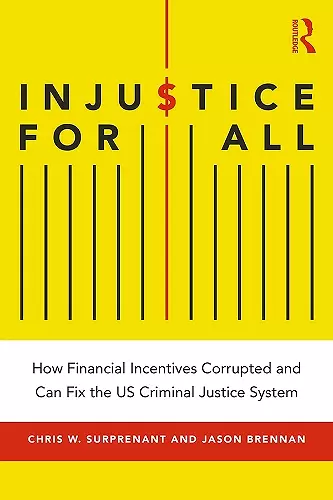Injustice for All
How Financial Incentives Corrupted and Can Fix the US Criminal Justice System
Jason Brennan author Chris Surprenant author
Format:Paperback
Publisher:Taylor & Francis Ltd
Published:9th Dec '19
Currently unavailable, and unfortunately no date known when it will be back
This paperback is available in another edition too:
- Hardback£145.00(9781138338807)

American criminal justice is a dysfunctional mess. Cops are too violent, the punishments are too punitive, and the so-called Land of the Free imprisons more people than any other country in the world. Understanding why means focusing on color—not only on black or white (which already has been studied extensively), but also on green.
The problem is that nearly everyone involved in criminal justice—including district attorneys, elected judges, the police, voters, and politicians—faces bad incentives. Local towns often would rather send people to prison on someone else’s dime than pay for more effective policing themselves. Local police forces can enrich themselves by turning into warrior cops who steal from innocent civilians. Voters have very little incentive to understand the basic facts about crime or how to fix it—and vote accordingly. And politicians have every incentive to cater to voters’ worst biases.
Injustice for All systematically diagnoses why and where American criminal justice goes wrong, and offers functional proposals for reform. By changing who pays for what, how people are appointed, how people are punished, and which things are criminalized, we can make the US a country which guarantees justice for all.
Key Features:
- Shows how bad incentives, not "bad apples," cause the dysfunction in American criminal justice
- Focuses not only on overincarceration, but on overcriminalization and other failures of the criminal justice system
- Provides a philosophical and practical defense of reducing the scope of what’s considered criminal activity
- Crosses ideological lines, highlighting both the weaknesses and strengths of liberal, conservative, and libertarian agendas
- Fully integrates tools from philosophy and social science, making this stand out from the many philosophy books on punishment, on the one hand, and the solely empirical studies from sociology and criminal science, on the other
- Avoids disciplinary jargon, broadening the book’s suitability for students and researchers in many different fields and for an interested general readership
- Offers plausible reforms that realign specific incentives with the public good. <
"'Follow the money’ isn’t just sound advice for people tracing political corruption or criminal activity. Brennan and Surprenant persuasively demonstrate that understanding financial incentives and how institutions are held accountable is critical for checking the dynamics that lead to mass incarceration and excessive criminalization. This insightful book offers countless examples of the ways in which perverse incentives lead to excessive punishment without bringing public safety or other benefits. If we want to take a more rational approach to criminal justice policy making, analyzing the incentives of institutional actors is the key place to start, as this book shows."
—Rachel Elise Barkow, author of Prisoners of Politics: Breaking the Cycle of Mass Incarceration
"The authors say interesting and at times provocative things about a number of important topics, and they do so in a clear, accessible, and engaging manner. They make good use of both specific examples and more general statistics and they strike a nice balance between the concrete and the theoretical. I highly recommend this book to anyone who is interested in thinking critically about our criminal justice system."
—David Boonin, University of Colorado, Boulder
ISBN: 9781138338821
Dimensions: unknown
Weight: 249g
178 pages